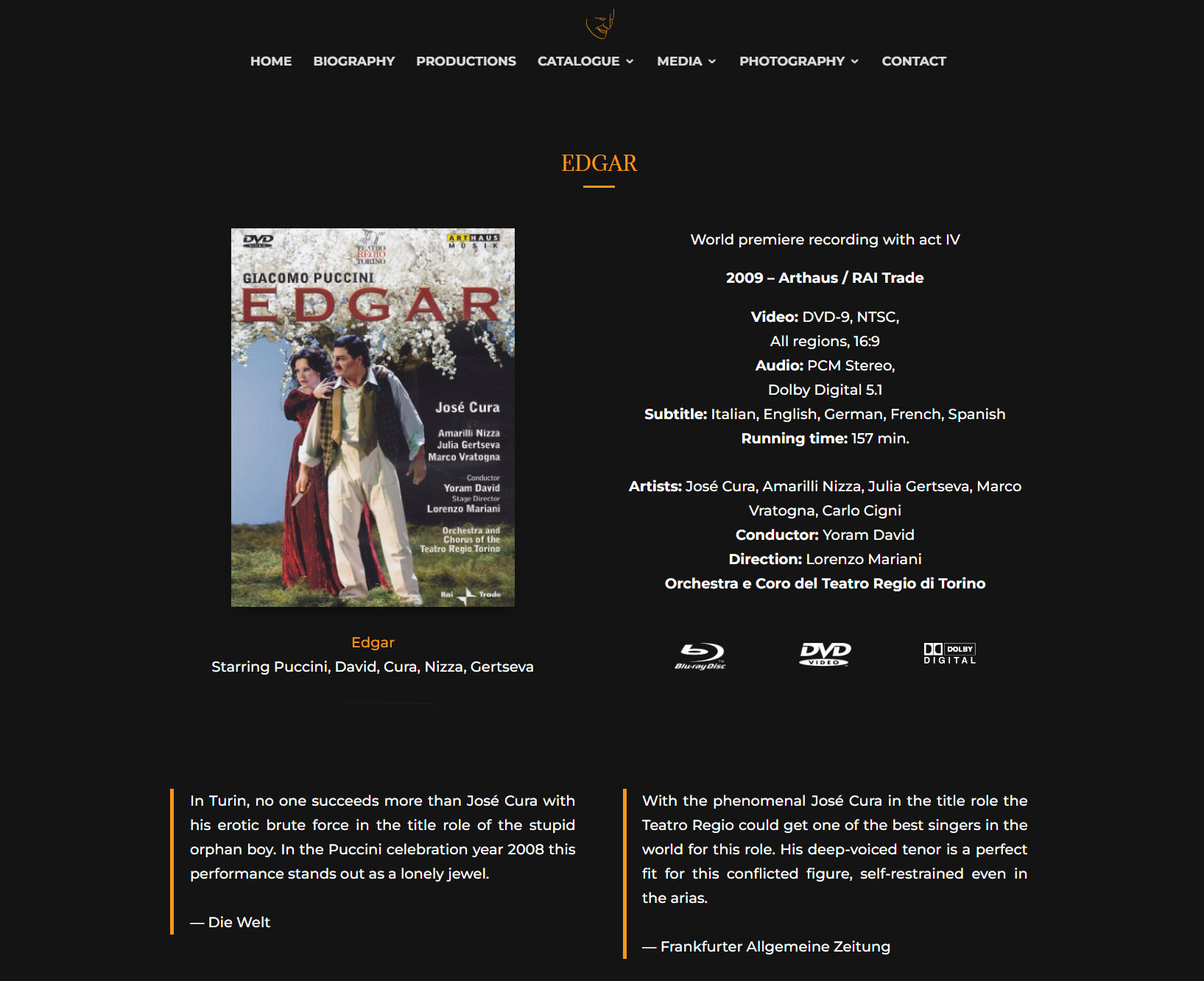
Bravo Cura
Celebrating José Cura--Singer, Conductor, Director
DVDs - Edgar

DVD Reviews
The DVD was recorded live in Turin in 2008
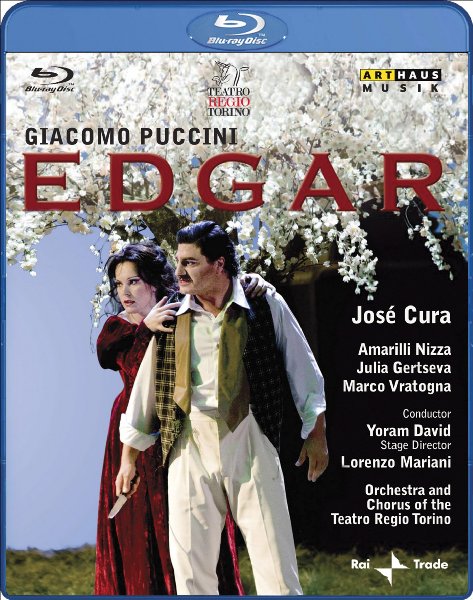 |
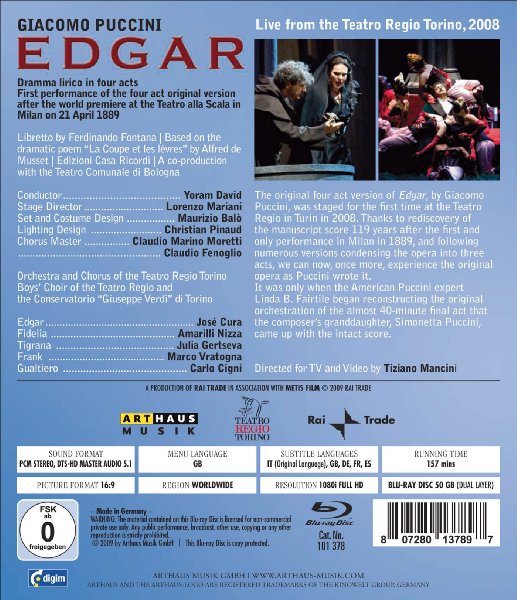 |
|
“José Cura defines the eponymous hero as a torn character with his expressive bronze tenor.” Kleinen Zeitung, 21 February 2010
“With strong male leads and a colorful, handsome staging by Lorenzo Mariani (with costumes and sets by Maurizio Balò), this Edgar makes for a mostly entertaining show. José Cura’s portrayal of Edgar gains strength as the character darkens. A less charismatic tenor might sing the entire role better, but really only a stage animal like Cura has a chance of making the character believable at all.” Opera Today, 30 August 2009
“Act 3 goes with terrific zest, José Cura as Edgar in disguise, holding forth with burnished tone.” Gramophone, December 2009
“Argentinean tenor José Cura is at his stentorian best, an approach that works well in this blood and guts piece, and he is in excellent voice. The unit set is beautiful, and the videography is superb. This is an important addition to the discography of early Puccini.” La Scena Musicale, November 2009
“Having unearthed an intact score of the original four-act version, the Teatro Regio staged the opera complete in 2008, with José Cura in the title role. The performance is rendered lovingly. Cura is an appropriately brooding, dissolute and enigmatic Edgar. One recognizes his familiar vocal virtue (big dramatic explosions) and deficiency (shortness of legato). But the overall performance works, particularly during the welcome Act IV.” Opera News, February 2010
“If this is second tier Puccini at heart, this live 2008 production courtesy of Teatro Regio Torino is big, frequently colorful and often quite compelling. Luckily the faults of the original piece and the sometimes frankly ridiculous staging choices here are frequently overcome by the commanding lead performance of Argentinian tenor José Cura, one of the most legendarily agile voices in opera today and one who brings his formidable brilliance to bear, providing Edgar what fitful life it has. Cura has an uncommonly large range and though Puccini provides the role with artfully high arias, the underlying gravitas of Cura's voice lends this interpretation a literal depth and tragic nuance it might not have otherwise. This is an important production from a historical perspective, but its absolute musical value may be more limited. That said, even second rate Puccini is some pretty heady stuff, and there is abundant melody and brilliant orchestration here to spare. The ultimate fate of this version of the opera may not be rosy, but Puccini fans are sure to want to see and hear this at least once in their lives.” Blu-ray.com, 27 September 2009
“José Cura delivers a vocally correct, theatrically expressive interpretation.” Pizzicato, December 2009
“José Cura lends impressive acting intensity to Edgar; his dark presence and the baritonal timbre of his tenor fit perfectly together.” Das Opernglas, November 2009
“José Cura's Carreras-with-squillo voice is in excellent shape here [in] a role that doesn't give him any plums. Still, it's good to know that he's still going strong. Visually and sonically, the DVD's production values are beyond reproach.” Fanfare, January-February 2010
“Obviously, the Argentine tenor found the measure of his character: with his dramatic, incandescent voice of power and color, he took on the Edgar role and made it absolutely convincing.” ClassiqueNews, 30 October 2009
“This 2008 Turin production, although a treat to the eyes and ears, proves that some works of art are best left at the bottom of a pile of dusty archives (where Puccini's original score had been found the year before). It's a waste of fine tenor José Cura in the title role.” The Star, 3 November 2009
“This is not just a beautifully designed, staged, and sung production of Puccini's second and least performed opera, but counts as an historical document as well. Preserved here is the first performance of the original four-act version since its world premiere (three performances only!) at La Scala in Milan on April 21, 1889. The singers are a well matched set with pride of place going to Cura's dramatic Edgar.” American Record Guide, January/February 2010
“This is not Puccini at his best. There is little character development, more a series of situations to which individuals respond - frequently without reason. Many non-sequiturs surround Edgar and his inexplicable impetuosity. Loud dominating noise accompanies many of his actions. Act 1 affords José Cura little or no opportunity to sing: plenty of declamation, plenty of hard-edged sound. Even when in disguise as the monk at his `own' funeral, there is more declamation until the trio when at last his superb enunciation shines through with some beauty of tone. Similarly in his final duet with Amarilli Nizza (Fidelia) he is given the chance to sing with restraint and so produces strong colouring - even if the music itself is somewhat tedious.” MusicWeb International, December 2009
“Act III goes with terrific zest, with José Cura as Edgar in disguise, holding forth with burnished tone.” BBC Magazine, December 2009
“This performance, honoring Puccini's 150th, is headed by the great Argentinean José Cura, so successful in Italian `heldentenor' repertory (Trovatore, Otello). He is heartrending in his immersion into Edgar's character.” Whole Note, 26 November 2009
“This Teatro Regio’s production of the original four-act version is quite alluring. The musical cast is beyond reproach. José Cura’s portrayal of Edgar is convincing. The voice has forceful energy, a seducing timbre, but high notes are occasionally screamed more than they are sung.” ConcertoNet, 2 April 2011
“Musically, this is a perfectly respectable performance, with José Cura committed in the title role.” Classical Music, 20 January 2012
“This [DVD] not make Edgar a masterpiece by any means, but at least a well-functioning ready-made piece. The singers play an essential part in this veritable salvation of honor, first and foremost José Cura, who portrays the title hero not as a weak man between two women, but as a torn and driven man, violent and at the same time full of tenderness.” OpernWelt, January 2010
“Puccini's second opera Edgar has some theatrical snags and the Teatro Regio Torino's production released by Arthaus does not always know how to deal with them. José Cura, however, makes us forget all the flaws by performing the lead role deeply and with great drama. What an artist. Tenor Cura plays the confused Edgar forcefully. From the first moment he appears, it is clear that he is not completely rational. He acts indifferently, with impulsive, temperamental outbursts. Only when he finds his beloved Fidelia in the last act does he completely relax and his attitude changes. Vocally, Cura masterfully portrays his character’s development. He is fierce in the first three acts; he sounds heavy and unyielding, with aggressive high notes. He goes from storm to hurricane and back again. Sometimes his excesses seem a bit too much, but Cura's intention with them becomes clear in the last act. Then his singing softens, even to an endearing pianissimo. It is precisely that peaceful glow about his singing that makes Tigrana's revenge at the end of the opera all the more bitter. The rest of the cast is somewhat in the shadow of Cura…” Place de l’Opera, 6 October 2009
"In Turin, no one succeeds more than José Cura with his erotic brute force in the title role of the stupid orphan boy. In the Puccini celebration year of 2008, this performance stands out as a lone jewel." Die Welt
"With the phenomenal José Cura in the title role the Teatro Regio could get one of the best singers in the world. His deep-voiced tenor is a perfect fit for this conflicted figure, self-restrained even in the arias." Frankfurter Allgemeine Zeitung |
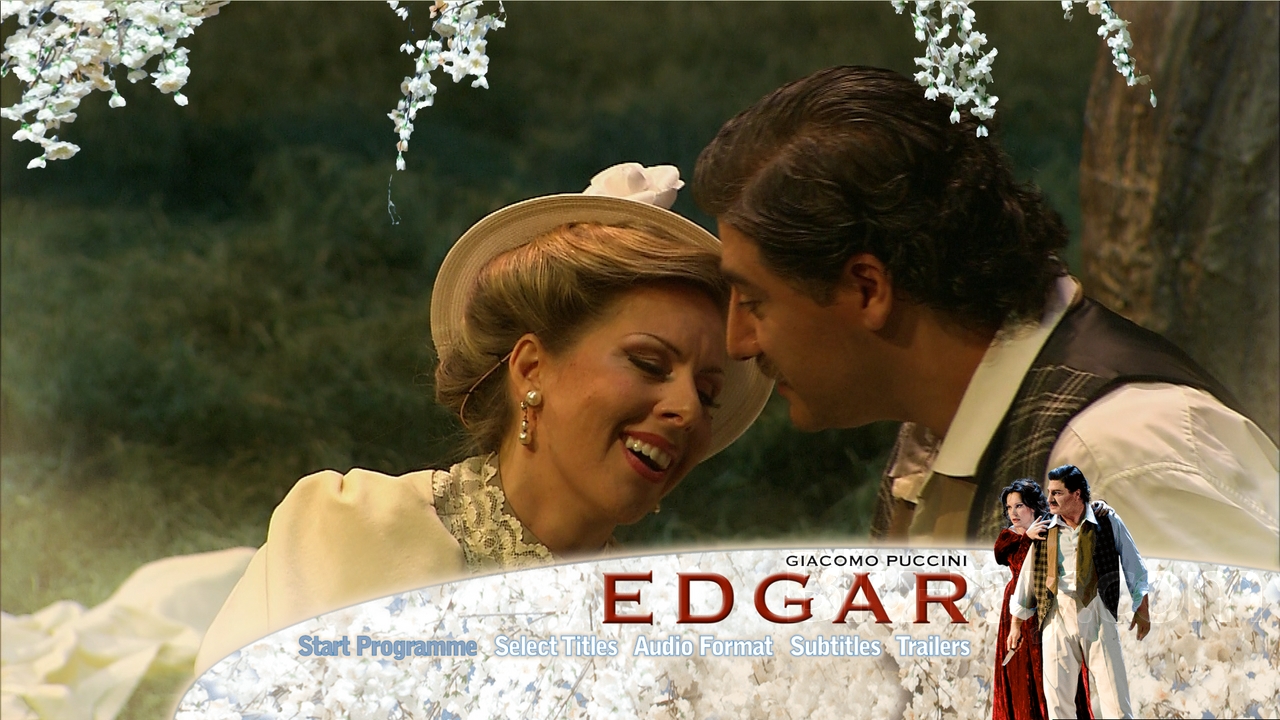
|
Rare 4-Act Edgar on DVD
Opera News February 2010 Ira Siff Sometimes, cutting an opera to make it more compact causes more problems than it solves. And when an opera is cut by the composer himself and revised for subsequent production, there is an assumption of improvement—as there was with Edgar, Puccini’s second opera and his only flop that did not turn into a hit after revision. The problem with the work was always felt to be the libretto by Ferdinando Fontana, a member of Milan’s group of young scapiglliati, a band of intellectuals who wanted to ‘reform’ art, and with whom Puccini briefly and not wholeheartedly. Fontana selected Alfred de Musset’s sprawling dramatic poem La Coupe et les Lévres to adapt as his libretto. In condensing the plot for opera, he lost much of the dramatic motivation, creating a text loaded with grand poetic statements that were often difficult to understand. In an attempt to salvage the opera, which Puccini rightly felt contained much music of merit, the composer cut it from four acts to three, shortening the piece but losing the dramatic arc and making the plot virtually incomprehensible. It is in this three-act form that Edgar has been performed since, most successfully as a concert opera, as this format allows its musical riches to shine forth without the insurmountable problems presented by the effort to stage it. Now, finally there is a solution—well, not a solution to the fact that Edgar is a flowed opera, but at least a way to appreciate more fully the virtues of the work. Having unearthed an intact score of the original four-act version, the Teatro Regio staged the opera complete in 2008, with José Cura in the title role. This version of Edgar is not without its shortcomings, but viewing this DVD demonstrates Puccini’s youthful genius more clearly. Choral numbers, always admired in Edgar, are here given their proper time to develop and build, and duets are more fully realized. The two leading ladies, the good, aptly named Fidelia and the bad, also aptly named Tigrana—are both given much more music that helps to develop their characters. Tigrana is still a caricature vamp, but in this version she is at least a fleshed-out caricature, possible for a singer to portray. Most important, the discarded Act IV is actual Puccini, in every sense. Puccini realized Fontana’s overblown approach was not for him, and he never looked back. Act IV of Edgar may be dramatically improbably after what precedes it, but taken on its own, it is a look forward to the Puccini ones knows and loves. There is a scena for Fidelia, the prototypical fragile Puccini heroine, and a love duet for her and Edgar that was largely reused in Act III of Tosca. (The composer knew this music was far too good to discard!) Elsewhere, Fidelia gets more of her wonderful ‘Nel villaggio d’Edgar,’ and Tigrana’s exciting brindisi and full duet with Edgar are restored, helping the problematic Act II. The opera takes on a shape, and once can see that Puccini did whatever he could to make this libretto viable, with the help of great music. The performance is rendered lovingly. Stage director Lorenzo Mariani updates the action from the thirteenth to the late nineteenth century; only a brothel scene in Act II with a bevy of whores wearing devil’s horns and bustiers really doesn’t work. More crucial, he has worked hard with his singers to draw committed performances from them. Cura is an appropriately brooding, dissolute and enigmatic Edgar. One recognizes h is familiar vocal virtue (big dramatic explosions) and deficiency (shortness of legato). But the overall performance works, particularly during the welcome Act IV. As Fidelia, Amarilli Nizza offers sensitive acting and an attractive timbre at the extreme top of her range. Low notes also work, but the middle and upper-middle registers can be indistinctly tuned, causing phrases to fall below the mark. Tigrana is a tough role, written with a mezzo-soprano color in mind but placed quite high. After a brief period of warming up, Julia Gertseva delivers the goods, especially in the difficult brindisi of Act II. Marco Vratogna as Frank (one of Puccini’s baritone good guys) sings the beautiful ‘Questo amor’ with the requisite layers of helpless passion and self-loathing. Edgar is very much a chorus opera; the choristers are as crucial as the principals. The Teatro Regio forces (under Claudio Marino Moretti’s direction) contribute generously, both vocally and dramatically. Yoram David conducts a strong, loving performance, which, after some stage and pit coordination problems at the beginning, takes off and delivers both the lyrical and more bombastic passages effectively.
|
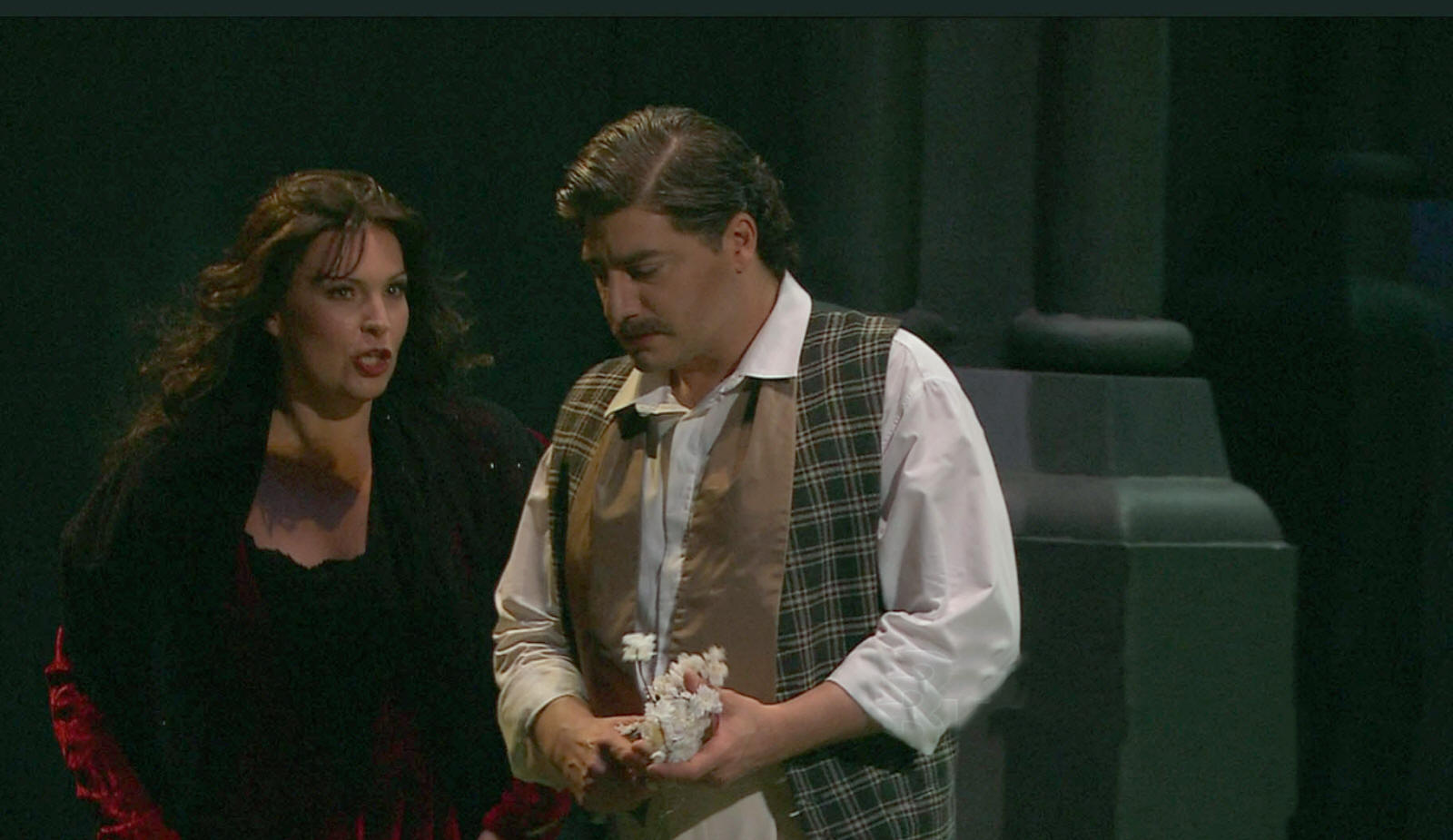
Puccini: Edgar(Blu-Ray version) Jeffrey Kauffman, September 27, 2009
If this is second tier Puccini
at heart, this live 2008 production courtesy of Teatro Regio Torino
is big, frequently colorful and often quite compelling. Unfortunately
director Lorenzo Mariana indicates a few times too many, spelling
out everything for the audience in unambiguous detail. How, for
example, do we know Tigrana (Julia Gertseva) is a tempestuous Gypsy,
up to no good? Why, she's clad entirely in red, and, just in case
you need a little Biblical imagery to complete the picture, she's
munching on an apple. Similarly, "good girl" Fidelia (Amarilli Nizza)
gets to wear virginal whites and yellows and wouldn't be caught
dead with fruit in her mouth. ArtHaus has provided a remarkably detailed DTS HD-MA 7.1 mix for Edgar. This is big, almost lascivious music a lot of the time (as was Puccini's wont), and this mix provides wonderfully detailed clarity and presence. The Orchestra of the Teatro Regio Torino performs with a fair amount of nuance, if not delicacy, and this soundtrack supports the often thick textures of Puccini's writing magnificently. Strings soar effortlessly above massed brass and reeds here, with all lines wonderfully clear. All of the voices are well recorded and mixed intelligently into the orchestral accompaniment. For such an overwhelming orchestra as Edgar often offers, there are, perhaps surprisingly, no balance issues to report. There is also a perfectly fine, if unremarkable, PCM 2.0 folddown mix that offers good clarity if noticeable thinness of sound when compared to the DTS mix. Edgar was a failure in its premiere for a reason, and the intervening years and successive revisions did little to change its reputation. This is an important production from a historical perspective, but its absolute musical value may be more limited. That said, even second rate Puccini is some pretty heady stuff, and there is abundant melody and brilliant orchestration here to spare. The ultimate fate of this version of the opera may not be rosy, but Puccini fans are sure to want to see and hear this at least once in their
|
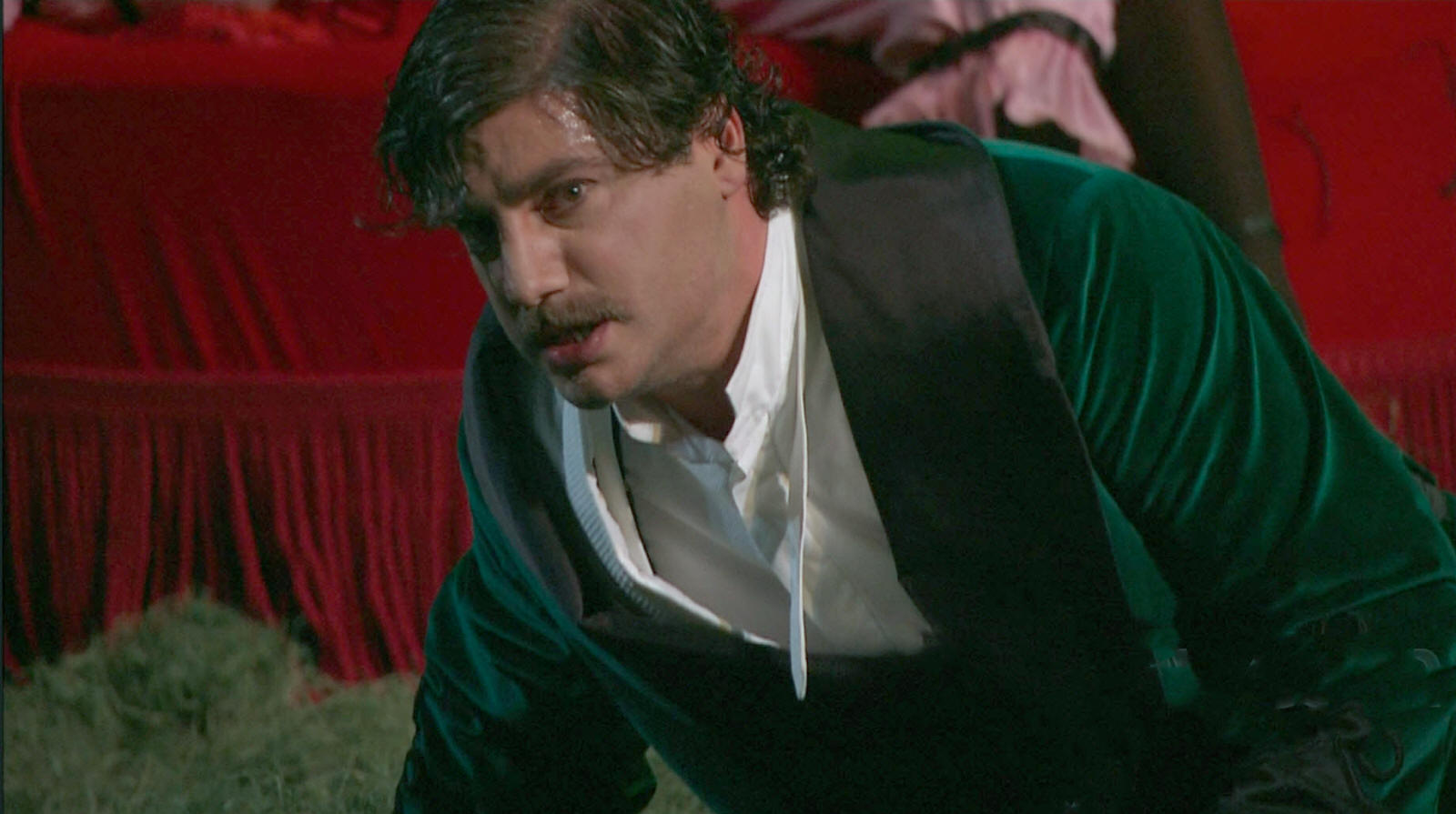
| José Cura Decorates Puccini's Edgar Place De L’Opera October 6, 2009
Note: This is a machine-based translation. We offer it only a a general guide but it should not be considered definitive.
|
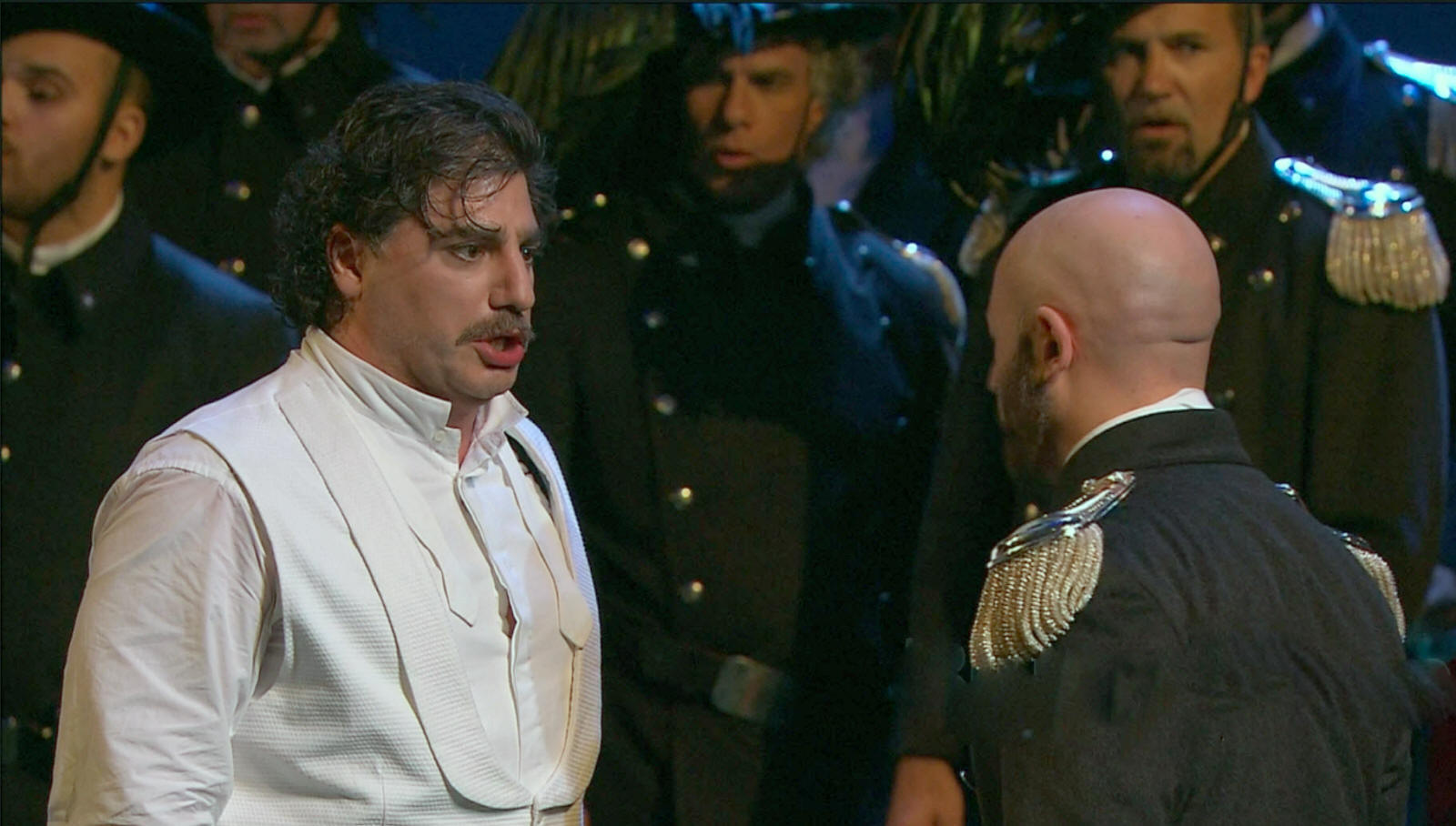
Last Updated: Sunday, March 10, 2024 © Copyright: Kira